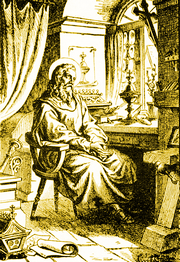Lives of the Saints
Our Models and Protectors
Spiritual Bouquet:
December 1

Saint Eligius or Eloy
Bishop of Noyon
(† 665)
Eligius, born near Limoges in the late sixth century, was in his childhood so skilled in manual arts, that his father decided to place him as an apprentice under a silversmith of Limoges. In a few years he had no rival in the art of metalworking. His piety and virtues recommended him still more highly than his talents; his frankness, prudence, gentleness and charity were admired by all.
The king of France, Clotaire II, heard of him, sent for him, and commanded him to make a golden throne adorned with jewels. For that purpose the king provided a large quantity of gold and precious stones, and with the materials given him Eligius made not one, but two magnificent thrones. Struck by the craftsman's rare honesty and ability, as well as by the overpowering beauty of his work, the king appointed him royal goldsmith for his kingdom, and kept him in his palace. Until then, the Saint had liked luxurious surroundings, but now, touched by a particular grace, he began to live in the midst of riches as a poor disciple of Jesus Christ. His greatest pleasure was to make beautiful reliquaries for the Saints. But best of all he loved the poor, and the treasures which passed from his hands into those of the indigent could scarcely be counted. When strangers asked to see him, they were told to go to a certain street and stop at the house in front of which a crowd of beggars was waiting; that would be his house. He would wash their feet, serve them with his own hands, take the last place at table, and eat only their leftovers. When Saint Eligius had no more money, he would give away his furnishings and his very cincture, his cloak and shoes.
The friendship of the Saint with King Dagobert, successor to Clotaire II, has become legendary. One day Eligius came to the king and said to him, My prince, I have come to ask a favor of you: give me the terrain of Solignac, that I may make a ladder by which you and I can both ascend to heaven. The king willingly consented, and the Saint built a monastery. Neither one became a monk, but Saint Eligius loved to visit the religious and spend a few days with them from time to time, to be edified by their regularity.
Saint Eligius was finally obliged to accept a nomination to the episcopal see of Noyon. His life as a bishop was the continuation of his good works. He possessed the gift of miracles; he cast out demons and cured the sick by a simple word or the touch of his hand. By a special gift of God, he found the bodies of Saints long honored, but whose burial places were unknown. It is he who found the sacred remains of Saint Quentin, the illustrious martyr, those of Saint Piat at Seclin, and of Saint Lucian at Beauvais; for all of these he himself made beautiful reliquaries. He died in 665, regretted by all.
Vie des Saints pour tous les jours de l'année, by Abbé L. Jaud (Mame: Tours, 1950); Little Pictorial Lives of the Saints, a compilation based on Butler's Lives of the Saints and other sources, by John Gilmary Shea (Benziger Brothers: New York, 1894).